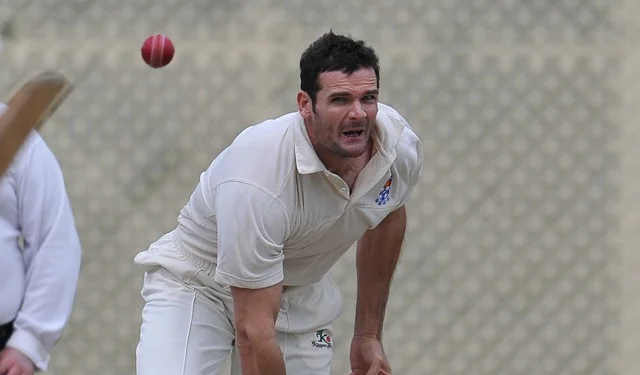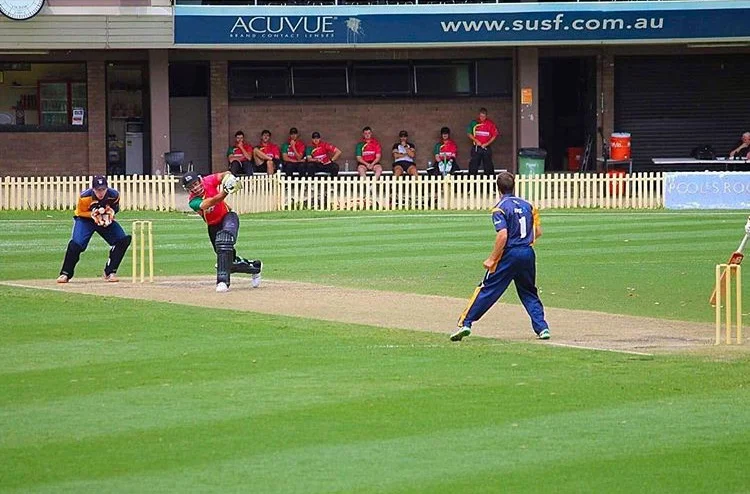1 Gordon’s challenge is serious
A couple of weeks ago, it was possible, if you wanted, to dismiss Gordon’s early-season surge as the by-product of a favourable draw and a few good individual efforts. No longer. Gordon outplayed Bankstown so thoroughly in Round Four that its bid to play finals cricket this season demands to be taken seriously. And, like many good teams, this Gordon side looks a bit stronger than the sum of its parts. Last year’s O’Reilly Medallist, Charlie Stobo, bowled well at Bankstown’s top order, but the critical blow was struck by the less obviously threatening seamer, Tym Crawford, who bowled the always-dangerous Philip Wells when he looked in particularly ominous form. Hampshire leg-spinner Mason Crane removed Bankstown captain Jarrad Burke, but it was his fellow-spinner Matt Junk – a Mosman Second Grader only last season - who ruined the lower end of the innings with 3-17. And when Bankstown seemed to have clawed its way back into the game, taking the eighth wicket with Gordon still needing 25 runs, it was James Kennedy (not best known for his batting) who steadied the innings with Axel Cahlin. Cahlin’s maiden First Grade century was memorable – he batted for five hours and ten minutes and carried his bat through the entire innings, becoming (at 18 years 237 days) the youngest player to do this in Sydney First Grade since Warren Bardsley in 1901. Gordon faces a struggling St George side this week, and it would be a brave punter who backed the visitors to break the winning streak.
2 Sydney is pretty good at Twenty20
This season’s Twenty20 Kingsgrove Sports Cup kicked off on Sunday, with the usual damage being done to the morale of bowlers everywhere. Nowhere was the damage quite as bad as at Drummoyne Oval, where Sydney restricted Eastern Suburbs to five for 107 before running down its target in only six overs and one ball. Most of the carnage was inflicted by Dan Smith, whose 67 not out came from only 22 balls, 14 of which he hit to or over the fence. At the other end, Joe Denly (who has played five T20 international for England) was comparatively sedate, lingering over 17 deliveries for his 35 not out. After the first five overs of the innings had gone for 81 runs, Easts captain Will Somerville brought himself on to stop the tide, only to concede 24 from his one over of the game. Sydney pulled off a tougher run chase later in the day, running down Newcastle’s 5 for 179 in the final over, Denly making 62 not out. With matches to come against Mosman and University of NSW, Sydney looks well placed to finish at or near the top of the Sydney Sixers Conference.
3 Ian Moran refuses to get old
Ian Moran’s exact age is a closely guarded secret, and a slower-than-usual start to the season (49 runs from his first three innings) made a few people wonder whether time might finally be catching up with him. Which may have encouraged Sutherland’s bowlers when they saw him coming in on Saturday, with the score at three for 49, and Easts in pursuit of an imposing target of 344. But people who underestimate Moran have often ended up looking foolish. Three and a half hours later, he had scored 173 not out from only 172 deliveries, blasting 23 fours and a six, and steered his side to a comfortable, five-wicket victory with plenty of time to spare. It’s an open question whether he would have batted on for a few more balls if he had known that he had ended the day with 11.998 First Grade runs – not that it mattered, since he passed the 12,000 run milestone the following morning in the Twenty20 match with Sydney. He has become only the fourth batsman to reach 12,000 runs in Sydney First Grade –after his former University team-mate, Greg Mail, Greg Hayne and Warren Bardsley. Moran did play for New South Wales – in the early days of the Twenty20 competition, before it was Big Bashed – but no-one has scored more First Grade runs without appearing in first-class cricket. If last weekend is any guide, there are plenty more runs to come.
4 Patience is a virtue
Every cricket coach ever has at some time lectured young players about the importance of patience to a batsman. But usually they mean patience during an innings – not waiting to get a bat at all. Damien Mortimer had to wait for the second day of his fourth match for Sydney University to get to the crease for the first time for his new club – a genuine trial his of focus and motivation. It turned out to be worth the wait: the former Campbelltown right-hander dominated the Hawkesbury attack, cracking 122 from 189 balls, with twelve fours and two sixes, and timing his square drive especially sweetly. Mortimer is only the second batsman to score a century in his initial First Grade innings for Sydney University – the first was Johnny Taylor, who made 141 not out against Randwick in 1922-23 (having already played for Petersham, NSW and Australia by that stage of his career). Mortimer followed up with 28 not out and 64 in Sunday’s Twenty20 games, so that over the course of one weekend, his season has advanced from “did not bat” to 214 runs at an average of 107.
5 Anthony Sams is seeing them well
Randwick-Petersham’s keeper-batsman Anthony Sams continued his excellent start to the season, making Blacktown’s total of 373 look distinctly under-par as he hit his second century of the season, and compiled an opening stand of 254 with his captain, Alexander Kemp. In four First Grade matches this season, Sams has hit152, 95, 79 and 121 – the main reason why his side sits fifth on the First Grade table, with three wins from four games.









